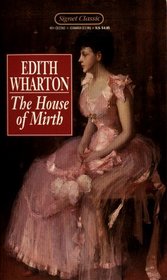Cayenne (princesscayenne) reviewed The House of Mirth (Penguin Great Books of the 20th Century) on + 12 more book reviews
** spoiler alert ** This novel follows primarily a young socialite named Lily Bart as she slowly ruins her life, dropping from the most beloved of country dinner visitors to a working class girl with an addiction to a sleep aid. Although many call this a love story, I think this would be classified as a love story in only the loosest sense, and in the great tradition of novels like Gone with the Wind and Wuthering Heights. If anyone's actually in love, it's rarely if ever admitted and certainly not happy.
When I began this book, without the slightest hint of what it might be about other than having previously read another of Wharton's works Ethan Frome, I assumed from the first chapter that the story would be a drawn out account of the changing of Lily's morals as she realizes that, obviously, Lawrence Selden (the pseudo "romantic interest") is the one for her, blah, blah, blah. As it turns out, Lily's morals change very little throughout the book, and her high standards of living combined with her strong moral fiber almost always ruin things for her. Why can't she just marry Selden and maintain her place in the social order and actually go a step up in her living conditions, if not achieving the wealth of which she dreams? Standards. Why can't she get over herself and marry Rosedale who will give her said wealth, even though she quite dislikes him? Standards. She simply can't be pleased. She won't marry for love and she won't marry for money - she's content to settle into old maidhood waiting for the perfect Mr. Right to come along. Meanwhile, her morals generally screw her over too. She has to stand by Bertha Dorset when she cheats! She can't use the love letters she found against her to regain her place and society and Rosedale's hand! She can't confess her undying love for Selden! But she's perfectly cool getting into various shady dealings with the Gormers, Mrs. Hatch and the chloral. Good God, Lily. She can't seem to decide what she wants and refuses to make the right decision throughout the book.
Although I found Lily to be in character throughout, I found so many of her decisions frustratingly stupid and unambitious (combined with her thoroughly ambitious personality) that I found it hard to love Lily as much as I would have otherwise. So many times, salvation was within reach. Actually, she didn't even have to reach for it. All she had to do was say the word and be whisked away from her depressing and anticlimactic end...but nope. Her standards/morals always got in the way.
Although I found the novel frustrating, slow and confusing (Wharton referred to characters exclusively by their first or last names for pages on end and then would spontaneously end, plus freaking everyone is related which is hard to remember) I did enjoy it. I would say it was really more of a 3.5 than a 3, a meh+ versus just a meh... But I also wouldn't quite say I "liked" it. I'm certainly glad I read it, but I'm also glad it's over.
When I began this book, without the slightest hint of what it might be about other than having previously read another of Wharton's works Ethan Frome, I assumed from the first chapter that the story would be a drawn out account of the changing of Lily's morals as she realizes that, obviously, Lawrence Selden (the pseudo "romantic interest") is the one for her, blah, blah, blah. As it turns out, Lily's morals change very little throughout the book, and her high standards of living combined with her strong moral fiber almost always ruin things for her. Why can't she just marry Selden and maintain her place in the social order and actually go a step up in her living conditions, if not achieving the wealth of which she dreams? Standards. Why can't she get over herself and marry Rosedale who will give her said wealth, even though she quite dislikes him? Standards. She simply can't be pleased. She won't marry for love and she won't marry for money - she's content to settle into old maidhood waiting for the perfect Mr. Right to come along. Meanwhile, her morals generally screw her over too. She has to stand by Bertha Dorset when she cheats! She can't use the love letters she found against her to regain her place and society and Rosedale's hand! She can't confess her undying love for Selden! But she's perfectly cool getting into various shady dealings with the Gormers, Mrs. Hatch and the chloral. Good God, Lily. She can't seem to decide what she wants and refuses to make the right decision throughout the book.
Although I found Lily to be in character throughout, I found so many of her decisions frustratingly stupid and unambitious (combined with her thoroughly ambitious personality) that I found it hard to love Lily as much as I would have otherwise. So many times, salvation was within reach. Actually, she didn't even have to reach for it. All she had to do was say the word and be whisked away from her depressing and anticlimactic end...but nope. Her standards/morals always got in the way.
Although I found the novel frustrating, slow and confusing (Wharton referred to characters exclusively by their first or last names for pages on end and then would spontaneously end, plus freaking everyone is related which is hard to remember) I did enjoy it. I would say it was really more of a 3.5 than a 3, a meh+ versus just a meh... But I also wouldn't quite say I "liked" it. I'm certainly glad I read it, but I'm also glad it's over.




